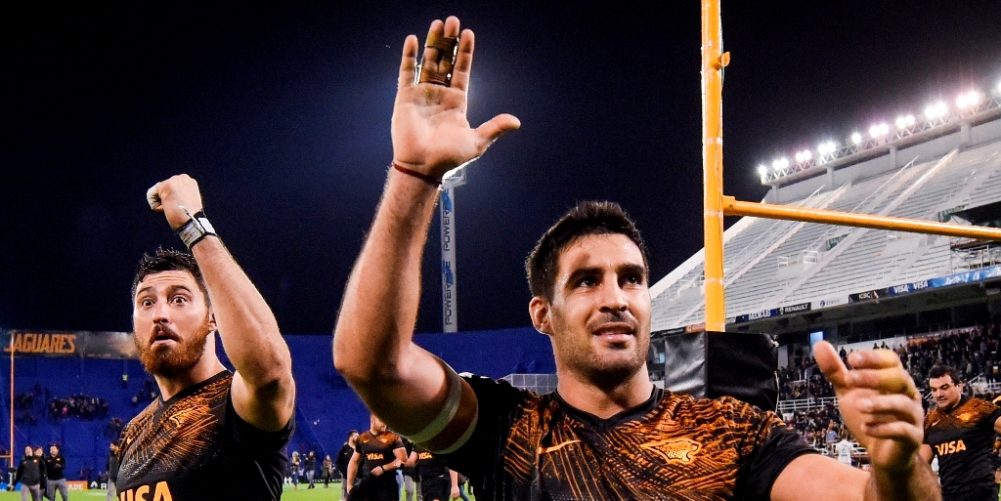Former England and Leicester fly-half Les Cusworth has spent the last 16 years living and working in Argentina, where he has helped the Pumas reach the level they are at today. He gives NEALE HARVEY his views on the game.
You’ve been involved in the growth of Argentine rugby for many years, how big a blow has it been to lose the Jaguares from Super Rugby?
It’s certainly through no fault of Argentina’s because the Jaguares got to the Super Rugby final last year and did remarkably well. Unfortunately, coronavirus has put the game of rugby throughout the world in a position it’s never been before and the Jaguares are obviously disappointed because it’s going to be very difficult now to find an external competition structure. Having said that, the strength of club rugby here is phenomenal and that won’t change in the foreseeable future.
Would the proposed new Super Liga Americana de Rugby provide a possible new outlet?
Maybe, but when you’re playing teams from Uruguay, Colombia, Brazil and Chile it’s quite a few notches down from Super Rugby. The costs of travelling are still high so who knows what the future of professional rugby will be – is it still sustainable in Europe, never mind South America? There’s reduced income coming into pro rugby in Argentina right now. TV money from Super Rugby has been smashed to pieces and what other viable competition is there? I don’t think there’s the money to sustain pro rugby here – even professional football struggles. That said, the system of amateur rugby here is the envy of the world and that will carry Argentina through.
With many top players leaving, can Argentina still be successful?
Yes, because in 2007 there was no Jaguares and something like 120 Argentine players were playing in Europe, but what Marcelo Loffreda did very cleverly at the time was to blend the amateur players here with the best of the professionals from abroad and I see us going back to something similar to that. While there’s going to be no magic solution, our head coach, Mario Ledesma – a fabulous former player and a mainstay of that brilliant 2007 side – has a very good understanding of what the problems are and how we can go about it.
How strong is the amateur club system in Argentina?
Incredibly strong. In Buenos Aires there is a Top 14 competition, which I’d say is of middle to lower Championship standard – excellent for amateur players – and below that there are almost 100 clubs in the city and province of Buenos Aires alone. Outside of that, you’ve got rugby hotbeds with their own leagues – Tucuman, Cordoba, Rosario, Mendoza etc – and they have a provincial championship as well. It’s not Premiership level, but it is a very good standard and that will underpin Argentinian rugby now.
Okay, but it’s never going to replicate Super Rugby, is it?
It would be nice to have the competition the Jaguares had been getting in Super Rugby because that gave our local guys the chance to test themselves against the best of New Zealand, South Africa and Australia – and we matched up very well. That will have an effect on the quality of performances by the Pumas in the short-term because they haven’t played since the World Cup, but what’s Covid-19 doing to the rest of the world as well? New Zealand are now having to look more into their own back yard for competition and as for South Africa, where do they go? There’s talk of them joining the PRO14 but is that going to be feasible with so many travel restrictions in place?
Australia are in big trouble as well, so I think Argentina are still going to be very competitive and you’ll see that spirit coming through. Look at football in Argentina, they lose all their best players abroad but Boca Juniors and River Plate are still very successful and Argentina continues to produce very good footballers who compete at world level. I’ve found in my 15-20 years of working with Argentinian rugby that they’re a special bunch when it comes down to competing in sports. They want external competition, of course, but you’ve got the problem of location and Covid-19, so for a while it’s a case of looking inwards and making our own competitions stronger. That’s what will happen and that’s why Argentina will still remain competitive.
You still have a close handle on what’s happening in England. With clubs losing a combined £40m-a-year and now with Covid on top, is the Premiership sustainable?
I don’t think it is sustainable in its current form and if you try to picture it in ten years’ time, are there too many professional clubs in England? Maybe there are, in which case do you think there’ll eventually be a British & Irish League? I think that’s a much more likely longer-term scenario – 14 teams and seal it off. Six teams from England, two from Scotland, three from Ireland and three from Wales – could you picture that in ten years?
Are Premiership clubs going to be able to continue paying out what they currently are in salaries – £1m-£1.5m a month? How can they keep that up without a rich benefactor? For me, if you’re looking forward, why don’t we have a B&I League, sealed off, and then let the rest of the community and semi-professional game thrive below that?
I’d imagine there’d be a lot of negative reaction to that suggestion?
It’s not for me to decide the right or wrong way but the question I’d ask is this: has the balance of the unions focussed too much on the professional aspect of the game? In other words, in England, are the RFU putting too much investment and time into the top end and not enough at the base? I’ve got a lot of time for the chief executive of the RFU, Bill Sweeney, who I think is a very intelligent guy, but when I look at what happens with rugby in Argentina, nearly everything is focussed on the base of the game and the amateur and community game here is thriving, which I don’t necessarily see is the case in England. In the village of Hurlingham, where I live in Buenos Aires, we have three rugby clubs. It’s half the size of a town like Wigan but each club has over 600 kids in its junior section, which is wonderful. It’s fine looking at the top and in England you see clubs like Exeter, Saracens and Sale who have been shining examples of clubs doing well, and the standard and quality of their homegrown players is incredible, but how is the conveyor belt below the Premiership really doing? The base doesn’t look all that strong to me and that probably needs addressing.
After 25 years of professionalism, how much does that latter perception concern you?
There are some athletes now who are top draw – your Owen Farrells and George Fords of the world or the pace and power of Jonny May. There are lots of them, but I just feel there’s a better balance to be struck between the elite aspect of the game and the rest of it. Unfortunately, there seems to be a massive disconnect and as soon as a game goes professional the priorities and objectives change. There are a lot of positives and when you look at the performances of Eddie Jones‘ England side, the skill level of how they play is quite breathtaking at times – the balance of pace and power is phenomenal – but I still ask the question: does the game need rebuilding a bit?
How do you mean, rebuilding?
It’s very difficult with the current financial cutbacks, but what Covid-19 has done is focussed the mind a bit more and people in the UK I talk to are asking what is it they want? I’d have thought you’d want to get more into the schools and rugby clubs and ask whether the laws of the game now are making it too physical a sport to be played by all. Do the laws need changing for amateur players? Another big decision that needs confronting at professional level is, are there now too many players on each side? There are 30 players on a pitch, there’s no space, it’s line against line and it’s a case of heads down, let’s charge and eventually break down the line through power. The safety aspects of the game need to be very carefully and continually monitored because greater athletes, greater velocity and greater power equates to harder collisions and consequently to bigger injuries and early retirements.
So, you’d reduce the number of players?
I’ve suggested 13-man rugby in the past and got laughed off the podium, but I’d love somebody, somewhere to try 13-man Rugby Union, maybe in schools or junior level. Keep the scrums, keep the lineouts, keep everything, just take two players off the pitch from each side.
Changing subjects, were you disappointed Agustin Pichot was not elected chairman of World Rugby?

The powerbase is in the UK and Europe and it was always going to be difficult for Gus to be elected. I’ve known him a long time and he’s a very talented entrepreneur – very bright, very sharp – who makes things happen. Was the game ready for substantial change? I think it was, and lessons need to be learnt. In order to bring the game together, the best solution for me would be to rotate the chairmanship between the northern and southern hemispheres every four years. To have never had a southern hemisphere chairman just can’t be right.
I’ve got the greatest respect for Bill Beaumont but having rotation would bring the world game closer together and I hope Agustin Pichot will have a rethink and stand again because his time will come.
How do you rate World Rugby’s governance at the current time?
They’re faced with Covid-19 and the world is really struggling, so all things considered they’re doing a pretty commendable job. The key for rugby moving forward is greater co-operation between the northern and southern hemispheres and you’d like to think they can align the two hemispheres through a new global season.
I accept there are difficulties around having the Six Nations and Rugby Championship at the same time, as well as aligning the Autumn Internationals, but a global calendar is long overdue.
I’d also look at eligibility for national teams. In the case of England, I’d allow only four overseas players in a Premiership matchday squad. It’s radical, but you should have a British passport if you want to play for the Home Nations and limiting the number of foreign players would force those unions to concentrate on developing their own players rather than relying on guys with residential qualifications or a granny who might have been born there. You need to create your own top players and allow so-called tier two nations to grow as well.
You’re still closely connected with Leicester, so how much does it pain you to see them struggling at the bottom of the Premiership?
Pain isn’t the word, it hurts much more than that! Richard Cockerill made a statement a while ago that the club seems to have lost its DNA – and you can’t argue with that, it’s not the club it was. Look at the number of players and coaches Leicester have had over the last few years and it says it all. A lot of people have come and gone and then you have ex-players like Cockerill, Sam Vesty, Paul Gustard and Dorian West doing well at other clubs and making a success of it, so why aren’t they involved? You’ve got to question the decision-making.
It’s in Steve Borthwick‘s court now and he comes with great credentials, but it’s a big ask and it will take time. Leicester have got the players but what Steve needs to do is change the mentality and get the winning culture back. There was an edge to Leicester that carried on for many years but they seem to have lost that. It’s a big job for Steve and they’ll need a bit of patience.
On a personal note, you moved to Argentina in 2006… could you ever have envisaged staying so long?
Never. It started in 2000 when I came here on holiday and Marcelo Loffreda wanted me to get involved. There was no contract and I worked for Rugby School in England at the time, but I came out four or five times a year and helped as technical director to the Pumas. In 2006, I moved over full-time to help set up the high-performance structure Argentina needed and it’s been very successful. By 2009 we’d created academies in Cordoba, Tucuman, Rosario, Mendoza and Buenos Aires and now there are 16 academies across Argentina for 16-20 years olds, all of which are doing fantastically well.
Tell us a bit about your work as an ambassador for the Atlas Foundation as well?
It’s a wonderful organisation that was set up by three props – Jason Leonard, Jeff Probyn and Paul Rendall – and it’s really opened my eyes. The Foundation takes rugby into townships and poor areas around the world and provides young boys and girls with opportunities that they would not have had without these projects. There are about 18 projects going on at the moment and here in Buenos Aires we have Virreyes Rugby Club, which is a fantastic project. During Covid they’ve been feeding 1,200 people a day and giving people a chance to play sport who otherwise might have got into trouble. In 50-odd years in rugby I’ve never seen anything like it, it’s humbling to be involved.























